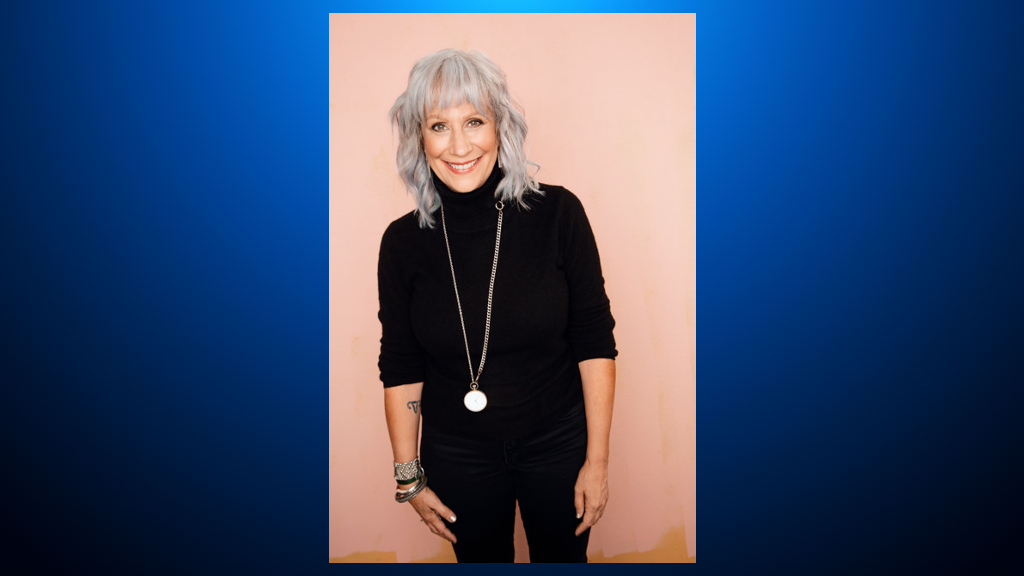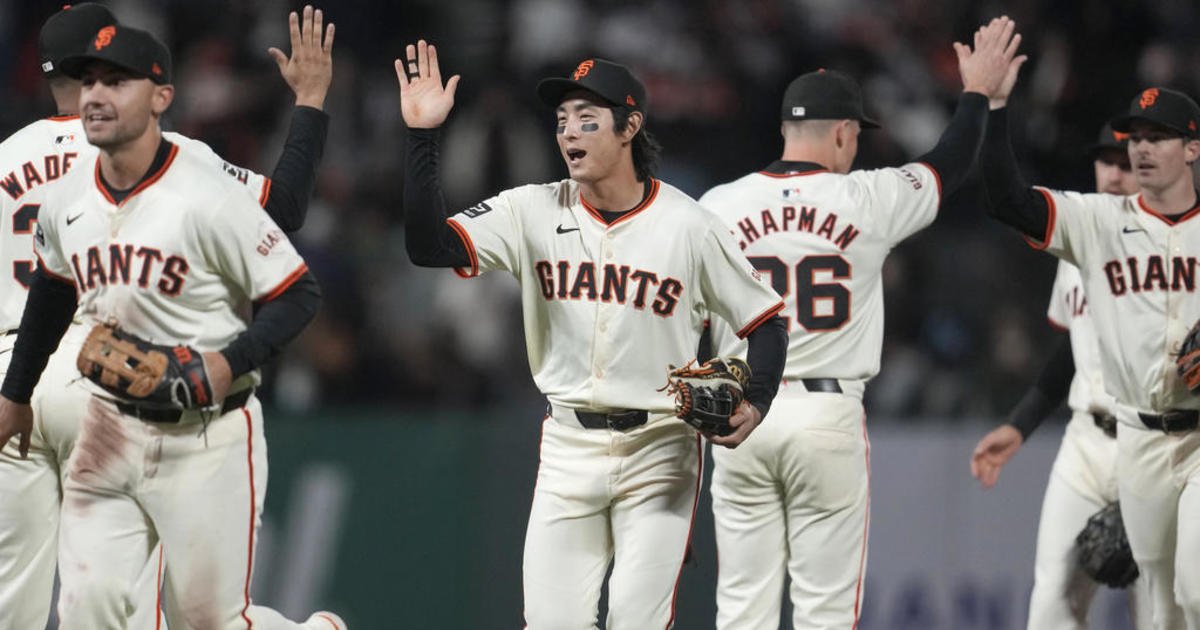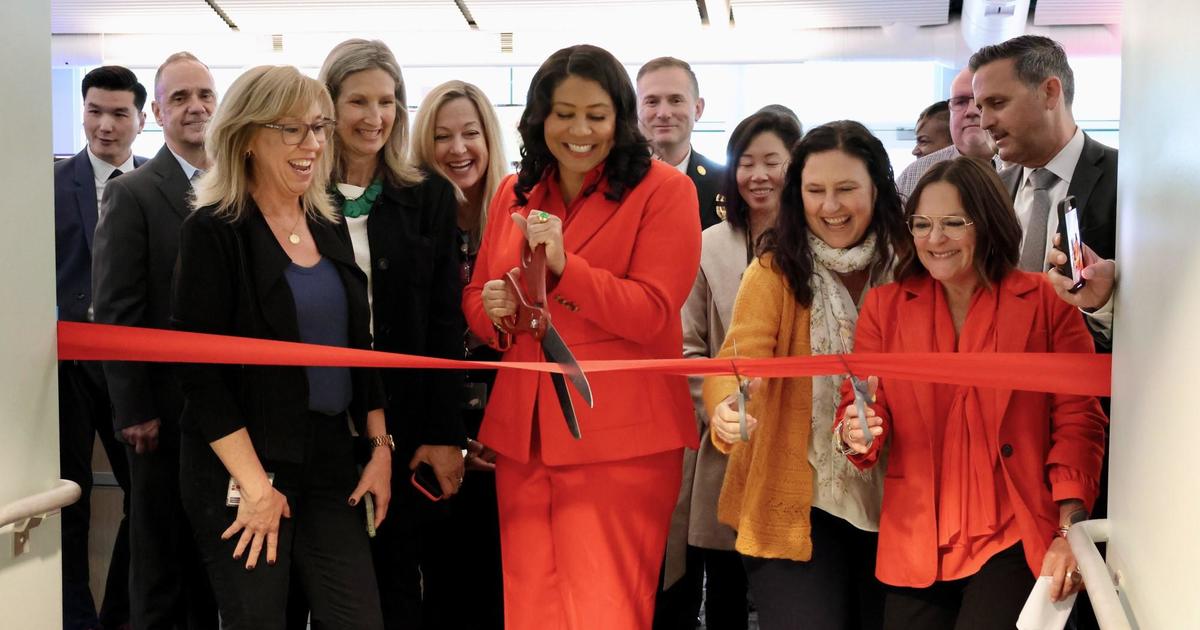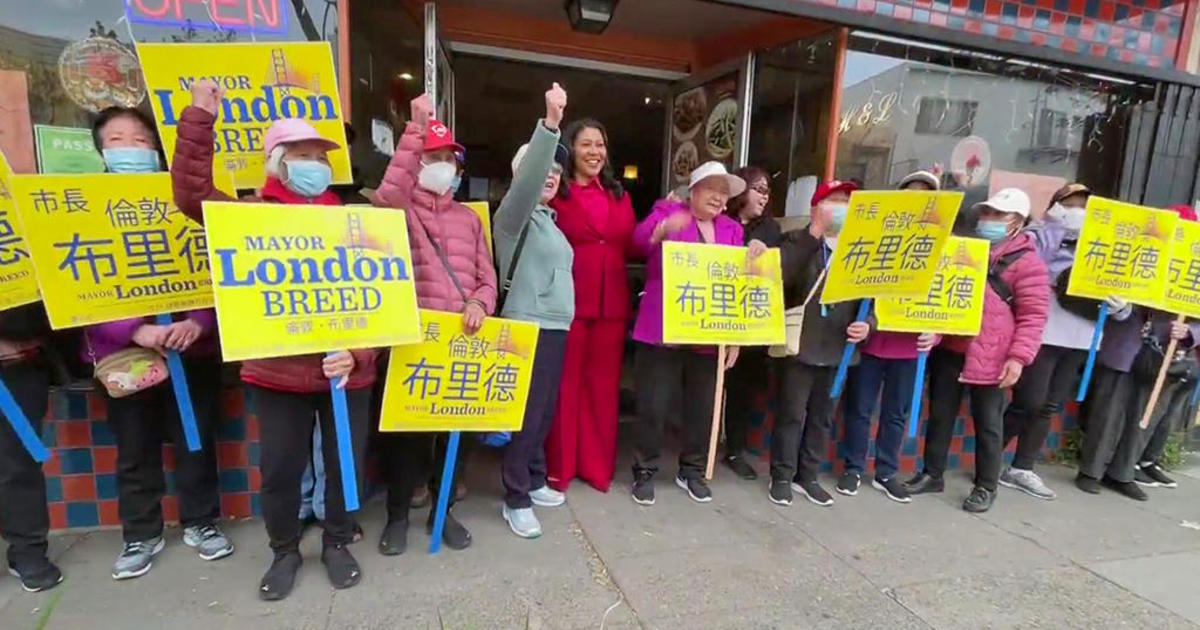CBS SF Talks to Comedian and Co-Creator of 'The Daily Show' Lizz Winstead (Part 1)
By Dave Pehling
SAN FRANCISCO (CBS SF) -- A veteran stand-up comedy talent who started her career in the early '80s, Lizz Winstead is perhaps even better known as one of the creative forces behind both "The Daily Show" and Air America Radio and as an astute political commentator and abortion-rights activist.
A native of Minnesota, Winstead made her stand-up debut in 1983 at the Brave New Workshop Comedy Theater in Minneapolis, getting her start amid a flourishing nightlife scene that had become an epicenter for both underground punk rock and the rise of the city's most successful musical export, Prince.
The comic became known for her sharp wit, Midwestern sensibility and biting political commentary, establishing herself as a national headliner at comedy clubs and regularly appearing on HBO and Showtime specials. While she continued to perform stand-up during the 1990s, Winstead began working behind the scenes as a writer and producer on shows for the then fledgling Comedy Central network.
ALSO READ: CBS SF Talks to Comedian and Co-Creator of 'The Daily Show' Lizz Winstead (Part 2)
After contributing to the short-lived program "Woman Aloud," she worked as a segment producer on "The Jon Stewart Show" -- lured there by her downstairs neighbor and future co-creator of "The Daily Show," producer Madeleine Smithberg. The two were tapped to come up with a nightly news parody Comedy Central in 1995 by network head Doug Herzog.
While Winstead would leave the show within three years after clashing with original host Craig Kilborn, she left an indelible mark on the show, both in the political slant of its cutting parody of the rising cable news networks that would win a slew of Emmys and Peabody Awards and by bringing on such talented correspondents as Stephen Colbert, Beth Littleford, Brian Unger and Lewis Black.
After her departure from "The Daily Show," Winstead became a commentator on CNN and MSNBC programs and a regular panelist on "Politically Incorrect" and "Tough Crowd with Colin Quinn" while continuing her stand-up career. She also teamed with Unger to create and co-host "O2Be," a satire of network morning programs that was broadcast on the Oxygen network.

Winstead's political acumen and sense of humor led her to be one of the co-founders and initial program director for progressive radio network Air America starting in 2003, helping elevate the profile of MSNBC host Rachel Maddow (Winstead co-hosted the daily morning program ""Unfiltered" with Maddow and Public Enemy founder Chuck D) establishing the voices of such notables as future Senator Al Franken, political commentator Sam Seder, comic/actress Janine Garafolo and "WTF" podcast host Marc Maron.
The financially troubled Air America would struggle both with its debts and its direction, leading Winstead to depart in 2005. Since then, she has continued to tour as a stand-up, worked as a producer and writer for television and wrote her first acclaimed book, Lizz Free or Die: Essays. In 2015, she founded Abortion Access Front, an activist group of comedians, writers, and producers committed to using humor to destigmatize abortion and expose the extremist anti-choice forces working to destroy access to reproductive rights across the country.
While the COVID-19 pandemic curbed her stand-up activity, Winstead has remained busy, celebrating the 25th anniversary of "The Daily Show" with a special streamed reunion with Smithberg and original on-air alumni of the show and released her latest stand-up special "Corona Borealis: A Night of Comedy Under the Stars" that was filmed outdoors and socially distanced in Minnesota, featuring two segments shot both before and after the 2020 election.
The comic is visiting two West Coast cities for indoor performances when she brings her "Bang the Dumb Slowly" show to Portland and San Francisco next week. Winstead recently spoke to CBS SF about coping with the pandemic and her fascinating career ahead of this show produced by Talent Moat at the Verdi Club in San Francisco on Saturday, Nov. 6, at 8 p.m. with support from Bay Area product Nato Green.
CBS SF: Are these are these your first in-person performances that you're doing since you recorded your special last year? Or have you managed to do some other one-off stuff or touring?
Lizz Winstead: I did a storytelling show last week. And that was the first indoor space I did. I did some outdoor car shows. But this is my first going into theaters and rooms. And it's been interesting, because even though all the shows are proof vax required and masked, that doesn't make people feel comfortable, right? And the audience that I'm servicing are actually science people and are just trying to be great.
If I was a dirt bag anti-masker or being like, "I'm oppressed that I have to live in society!" you know, I would be selling out giant rooms. But I'm kind of okay with that. Baby steps for whoever wants to come out and feels comfortable coming out. I feel like we just need a night with each other to really just let loose and process this scorched earth terra firma that so many people have created for the rest of us just trying to live our lives.
CBS SF: I totally agree. I stayed sane through the pandemic seeing these small outdoor live music shows that were happening, and just this last weekend went to a big garage rock festival in Oakland that was mostly people masked people. I guess that's one good thing about coming to the Bay Area, is people are ready to go the extra mile as far as safety. I mean, you can't even go into a bar or restaurant in San Francisco without proving you've had the vaccine. It's stricter here.
Lizz Winstead: It's the same way here in New York City. I live part of the time in Minnesota and part of the time in New York, so I'm in concentric sanity circles.
CBS SF: I watched the trailer for the comedy special you did late last year where you kind of channeled your feelings about the chaos of 2020. As far as that structure of filming two segments before and after the election, did you have some concerns -- beyond the general apocalypse and what it would mean for the planet if Trump won -- that it would be a dark and darker sort of comedy special?
Lizz Winstead: Yeah, this is certainly the darkest times that I've lived in during my comedy career. But there's been years -- and every year I tour and I'm responding to the world -- there were other years where it's been horrifying as well, you know? I mean, the 2016 election was fairly horrible. And then 2017 was just like Cosby and so much raping. And [earlier in 2016] Prince and Bowie died. So there's been years where you have to mine it and I think that humor has always played a role in the darkest of times. And it has been a reliable friend for a lot of people.
It's tricky when it's also happening to you. Sometimes you can be detached from it. When you have a lot of privilege, you can be detached from the world and what's happening. But you can respond to it, and we no longer can be detached from the world, really. If you are, then you're kind of jerk. Also what's your role in it, right? When you have a racial awakening -- or as I like to call it COVID 1619 -- where white supremacy is reigning supreme, what is the role for me as a person who is White when Black folks should be leading the way? And are leading the way.
And I realized that sometimes my audience is a lot of public-radio listening white folks who think they know best, and also who think they know more than they know. So to be able to talk about defunding the police or talking about trans folks or even talking about abortion, there's a lot of growth areas that folks need to be talked to about. In the middle of my special, I had a Black trans city council person who was the council person for George Floyd's district having a conversation, talking about what she believes reimagining police force looks and to talk about what it means for her to be in the world.
And she even said to me, "You asked me to come -- as a Black trans woman -- you asked me to drive here to the woods. Like you didn't even think about that." She called me on it and I left it in the special, you know? Because it's true. We're always self examining, and calling yourself out on your s--t also is super important. It just is. It's so easy to always be like, "Oh, I don't want to confront Aunt Racist at Thanksgiving. I'm just gonna let that go." But you kind of can't. You've got to be like, "Look, you're about to become Aunt Karen in about five seconds, so if I don't say something to you, you could go out there and scream at a birdwatcher and become national news. I'm trying to prevent that from happening for you. You're welcome."
CBS SF: It's protecting you!
Lizz Winstead: Yes! From yourself!
CBS SF: But it's interesting what you just said about your audience: the idea that it's like it's largely White NPR listeners. There's that aspect that you're preaching to the choir, but also that preaching to the choir that maybe is not as much of the choir as they think you are? Which I had not really thought about.
Lizz Winstead: Well, I think it's a choir that knows some songs really well by heart and responds really well, but there are some songs that no one has ever introduced them to, and you need to know them to be a really good choir. So let's have a conversation about those songs.
I get that question a lot from people: 'Do you think you're preaching to the choir?' And I always say, "Would you walk into a butcher shop and say, 'Why aren't you selling fish here? Aren't you just trying to sell to people who eat meat?'" There are people who want what I have to say, and if they're open to laying it out, then that means I can bring a different take. I can bring a different spin, I can bring a different perspective from the work I do. And I think that's the valuable part.
Is this tour going to be touching on the material that you that you did in the special? Because there is a ton of stuff you can talk about that's happened since that special. It's endless.
Lizz Winstead: Yeah, there will be some stuff, but I do my big year-end review over New Year's Eve in the Twin Cities, there I will include the election and Trump not leaving. But I think what I'm really going to cover [for these dates] is a lot of stuff around Biden, abortion, immigration, these radical parents who are storming school board meetings, the January 6 fiasco. So I will touch on some of that, but since COVID, there's just been more COVID, you know? There's the Delta variant versus the regular. It's like we supersized our COVID. And looking at where we're at with voter fraud.
So I'll be talking about things that are really relevant and weaving it in and out with my own personal navigation of it and then just being in it with everyone else. Like "Jeopardy" was my solace. And then all of a sudden "Jeopardy" became some sort of like...is Dick Cheney literally picking the new host of "Jeopardy?" What happened? So there'll be a lot of looking at what we're all talking about right now -- because there's a lot of information around it -- and processing it aloud.
Because I think we have a lot of questions that we ask ourselves a lot. Like these people who are just storming the school board meetings, screaming about critical race theory. You don't even know what you're talking about! You were bitching that you didn't want to school your children at home; it was too much. And then when your kids go back to school, you're bitching about what happens to them at school.
So then when you ask, "Why don't you just school them at home?" they say, "Well, I I couldn't possibly do that because I have to spend my morning spewing hatred outside of the school, my afternoons bounty hunting abortion doctors, and then my evening, you know, I barely have time to DVR Tucker Carlson and masturbate." What is going on?
CBS SF: It does kind of blow my mind that there are people trying to organize a national strike of students not going to school over COVID policies at schools. This is not solving anything...
Lizz Winstead: Isn't that called what we were doing last year and you were mad about it? That's the part that's wild. And then you have school superintendents -- Texas is some kind of ground zero for every s----y thing on the planet -- you have school superintendents literally lecturing teachers saying, "Make sure you have books that balance out like the Holocaust." Where do you go from there? What is the other side of the Holocaust? Charlottesville? Nazis are just like us; they pull on their jackboots one foot at a time.
I don't even know what to say anymore, because it feels so wild. When you hear Joe Manchin screaming about how he will only sign bills that have bipartisan support, it's like, "Dude, one party's off the rails. So the bipartisanship that you're talking about, is negotiating with the factions within your own party. We need to reframe what bipartisanship looks like, because you got to take the White Walkers out of the conversation.
CBS SF: Maybe there should be less crazy in the legislation; less input from the crazy people?
Lizz Winstead: Yeah! For years, I always wondered, "Nancy Pelosi, how does she do it?: And now I understand why people in politics get Botox; because you have to freeze the disdain in your face. You literally have to freeze your emotion out, because you can't take it. It's too much.
CBS SF: Did you expect that -- even with Trump out of the White House -- that the attack on abortion rights would ramp up to the degree that it has since he lost the election?
Lizz Winstead: Yes. I'm somebody who runs an abortion-rights organization. And this is the part of the education piece that I think Americans don't really understand. Back in 2010, and this is when I got really involved ; I've always been pro choice and done benefits. Mike Pence was still in Congress. It was the Tea Party revolution. And the first thing that Mike Pence proposed was to defund Planned Parenthood, the National Parks, and public media. And I was like, "Are they performing abortions on Car Talk in Yosemite? Because I feel like they're not." I don't know why that's all one thing.
But when he did that, it made me wonder what was happening. And then Texas happened. Wendy Davis happened. And what a lot of folks don't understand is the year that Wendy Davis filibustered in Texas, 26 other states dropped that exact piece of legislation. It was written by an organization called Americans United For Life. And they dropped that organization into state legislatures around the country, but nobody looked to see in their own states.
So I knew that this was happening forever and it just didn't make national news. And part of the problem is there would be a smattering of a story here from Indiana or Ohio or someplace, and the national news would say, "Oh, well that's happening in Ohio, so that's not here." They were not watching the trends. And so I started the organization so that I could raise awareness about these trends.
And not unlike being an political observer of conspiracy theories in the world, there are so many abortion conspiracy theories that are believed and promoted by the same folks -- because those intersections are the same, right? Whether it's abortion reversal, when you have 12 states that force a doctor to consult their patient about this thing that's not real called abortion reversal, you're like, "How is that possible? That a doctor has to lie about a medical fantasy that doesn't exist?"
So all of this stuff has been going on for a long time, and so that's part of what we do is just sound the alarm on that the nation is creating this. And when you have legislators who are hostile towards abortion access and promoting things that aren't true, and then you have lower court system and now a Supreme Court stacked with anti-abortion judges, the only hope we have right now is to pay really close attention to who these folks are in our state and local government and make sure that we toss them out of office, or that new anti-abortion people don't get elected. And Texas has always been extra. It's just so extra.
CBS SF: I noticed in the in the trailer for your special that you used Prince's music. I can only imagine how deeply rooted his music must have been in your life growing up in Minneapolis, though I guess you're fairly contemporary with him. You were probably already doing stand up when he was becoming massive. So was it hard to get a Prince tune licensed for it? Or do you get the Minneapolis stamp of approval of being from there?
Lizz Winstead: That song is actually a reimagining of "Controversy" by cover band in Minneapolis that does a whole Prince show, so they did a really good job. I wrote a book a few years back where I talk about my experiences, because I'm one of the lucky people who are in that sweet spot of age. I'm 60. I came of age in Minneapolis during punk rock and during the funk explosion. So living in the Twin Cities at that time, we all worked at the same restaurants, covered each other's shifts.
I worked at First Avenue and I saw Prince perform every single time he did surprise shows at First Avenue, all 12. And it was it was incredible to be able to never pay a dime to see the Replacements or Husker Du or Soul Asylum and work at First Avenue. To be able to just be on each other's guestlists. The same $20 bill went around about the same six bars.
The comedy scene and the music scene were inextricably linked and it was really fun. When Bob Mould did his first solo tour, I went out and opened for him with Vic Chesnutt on a couple of dates. So it was really a great time to be there and creative. And then you have the journalists on top of that: David Carr, Michele Norris was my roommate in college.
So there was this cross pollination of writers and musicians and comedians and theatre that created this oasis for a lot of folks who were queer and awkward and creative. A lot of people from small communities looked at Chicago as being terrifying, but saw Minneapolis as a soft place to land. And not only was it a soft place to land, it was an epicenter for rage and angst that was really incredible.
CBS SF: Your connection with the city must have made some of what went down in the past year that much more difficult to process...
Lizz Winstead: 100%. You wonder what Prince would have done and how Prince would have reacted. I went back during the pandemic, as you know, because I made my special there. But I went back to be there just so I could culturally be outside.
Because Minnesotans are such a hearty stock that I knew that what I needed to nourish my soul would happen no matter what the temperature was, because that's who we are as a people. And it did not prove me wrong. I did the second half of my special in 19 degree weather in November around a fire.
Part 2 of this interview with Lizz Winstead can be found here.



